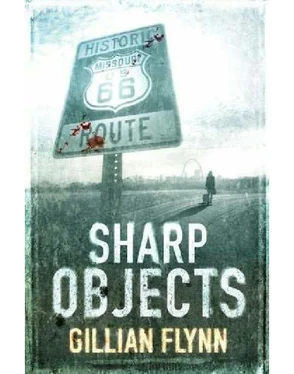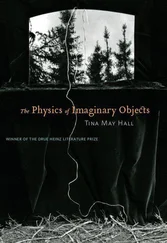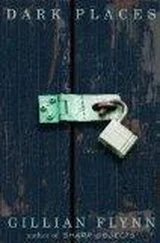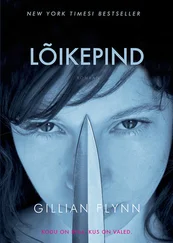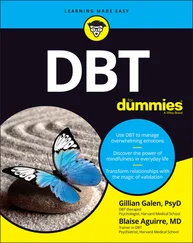Flynn, Gillian - Sharp_Objects
Здесь есть возможность читать онлайн «Flynn, Gillian - Sharp_Objects» весь текст электронной книги совершенно бесплатно (целиком полную версию без сокращений). В некоторых случаях можно слушать аудио, скачать через торрент в формате fb2 и присутствует краткое содержание. Жанр: Старинная литература, на русском языке. Описание произведения, (предисловие) а так же отзывы посетителей доступны на портале библиотеки ЛибКат.
- Название:Sharp_Objects
- Автор:
- Жанр:
- Год:неизвестен
- ISBN:нет данных
- Рейтинг книги:5 / 5. Голосов: 1
-
Избранное:Добавить в избранное
- Отзывы:
-
Ваша оценка:
- 100
- 1
- 2
- 3
- 4
- 5
Sharp_Objects: краткое содержание, описание и аннотация
Предлагаем к чтению аннотацию, описание, краткое содержание или предисловие (зависит от того, что написал сам автор книги «Sharp_Objects»). Если вы не нашли необходимую информацию о книге — напишите в комментариях, мы постараемся отыскать её.
Sharp_Objects — читать онлайн бесплатно полную книгу (весь текст) целиком
Ниже представлен текст книги, разбитый по страницам. Система сохранения места последней прочитанной страницы, позволяет с удобством читать онлайн бесплатно книгу «Sharp_Objects», без необходимости каждый раз заново искать на чём Вы остановились. Поставьте закладку, и сможете в любой момент перейти на страницу, на которой закончили чтение.
Интервал:
Закладка:
Contents
Cover Page
Title Page
Dedication
Chapter One
Chapter Two
Chapter Three
Chapter Four
Chapter Five
Chapter Six
Chapter Seven
Chapter Eight
Chapter Nine
Chapter Ten
Chapter Eleven
Chapter Twelve
Chapter Thirteen
Chapter Fourteen
Chapter Fifteen
Chapter Sixteen
Chapter Seventeen
Epilogue
Acknowledgments
About the Author
Copyright
For my parents,
Matt and Judith Flynn
Chapter One
My sweater was new, stinging red and ugly. It was May 12 but the temperature had dipped to the forties, and after four days shivering in my shirtsleeves, I grabbed cover at a tag sale rather than dig through my boxed-up winter clothes. Spring in Chicago.
In my gunny-covered cubicle I sat staring at the computer screen. My story for the day was a limp sort of evil. Four kids, ages two through six, were found locked in a room on the South Side with a couple of tuna sandwiches and a quart of milk. They’d been left three days, flurrying like chickens over the food and feces on the carpet. Their mother had wandered off for a suck on the pipe and just forgotten. Sometimes that’s what happens. No cigarette burns, no bone snaps. Just an irretrievable slipping. I’d seen the mother after the arrest: twenty-two-year-old Tammy Davis, blonde and fat, with pink rouge on her cheeks in two perfect circles the size of shot glasses. I could imagine her sitting on a shambled-down sofa, her lips on that metal, a sharp burst of smoke. Then all was fast floating, her kids way behind, as she shot back to junior high, when the boys still cared and she was the prettiest, a glossy-lipped thirteen-year-old who mouthed cinnamon sticks before she kissed.
A belly. A smell. Cigarettes and old coffee. My editor, esteemed, weary Frank Curry, rocking back in his cracked Hush Puppies. His teeth soaked in brown tobacco saliva.
“Where are you on the story, kiddo?” There was a silver tack on my desk, point up. He pushed it lightly under a yellow thumbnail.
“Near done.” I had three inches of copy. I needed ten.
“Good. Fuck her, file it, and come to my office.”
“I can come now.”
“Fuck her, file it, then come to my office.”
“Fine. Ten minutes.” I wanted my thumbtack back.
He started out of my cubicle. His tie swayed down near his crotch.
“Preaker?”
“Yes, Curry?”
“Fuck her.”
Frank Curry thinks I’m a soft touch. Might be because I’m a woman. Might be because I’m a soft touch.
Curry’s office is on the third floor. I’m sure he gets panicky-pissed every time he looks out the window and sees the trunk of a tree. Good editors don’t see bark; they see leaves—if they can even make out trees from up on the twentieth, thirtieth floor. But for the Daily Post, fourth-largest paper in Chicago, relegated to the suburbs, there’s room to sprawl. Three floors will do, spreading relentlessly outward, like a spill, unnoticed among the carpet retailers and lamp shops. A corporate developer produced our township over three well-organized years—1961–64—then named it after his daughter, who’d suffered a serious equestrian accident a month before the job was finished. Aurora Springs, he ordered, pausing for a photo by a brand-new city sign. Then he took his family and left. The daughter, now in her fifties and fine except for an occasional tingling in her arms, lives in Florida and returns every few years to take a photo by her namesake sign, just like Pop.
I wrote the story on her last visit. Curry hated it, hates most slice-of-life pieces. He got smashed off old Chambord while he read it, left his office smelling like raspberries. Curry gets drunk fairly quietly, but often. It’s not the reason, though, that he has such a cozy view of the ground. That’s just yawing bad luck.
I walked in and shut the door to his office, which isn’t how I’d ever imagined my editor’s office would look. I craved big oak panels, a window pane in the door—marked Chief—so the cub reporters could watch us rage over First Amendment rights. Curry’s office is bland and institutional, like the rest of the building. You could debate journalism or get a Pap smear. No one cared.
“Tell me about Wind Gap.” Curry held the tip of a ballpoint pen at his grizzled chin. I could picture the tiny prick of blue it would leave among the stubble.
“It’s at the very bottom of Missouri, in the boot heel. Spitting distance from Tennessee and Arkansas,” I said, hustling for my facts. Curry loved to drill reporters on any topics he deemed pertinent—the number of murders in Chicago last year, the demographics for Cook County, or, for some reason, the story of my hometown, a topic I preferred to avoid. “It’s been around since before the Civil War,” I continued. “It’s near the Mississippi, so it was a port city at one point. Now its biggest business is hog butchering. About two thousand people live there. Old money and trash.”
“Which are you?”
“I’m trash. From old money.” I smiled. He frowned.
“And what the hell is going on?”
I sat silent, cataloguing various disasters that might have befallen Wind Gap. It’s one of those crummy towns prone to misery: A bus collision or a twister. An explosion at the silo or a toddler down a well. I was also sulking a bit. I’d hoped—as I always do when Curry calls me into his office—that he was going to compliment me on a recent piece, promote me to a better beat, hell, slide over a slip of paper with a 1 percent raise scrawled on it—but I was unprepared to chat about current events in Wind Gap.
“Your mom’s still there, right, Preaker?”
“Mom. Stepdad.” A half sister born when I was in college, her existence so unreal to me I often forgot her name. Amma. And then Marian, always long-gone Marian.
“Well dammit, you ever talk to them?” Not since Christmas: a chilly, polite call after administering three bourbons. I’d worried my mother could smell it through the phone lines.
“Not lately.”
“Jesus Christ, Preaker, read the wires sometime. I guess there was a murder last August? Little girl strangled?”
I nodded like I knew. I was lying. My mother was the only person in Wind Gap with whom I had even a limited connection, and she’d said nothing. Curious.
“Now another one’s missing. Sounds like it might be a serial to me. Drive down there and get me the story. Go quick. Be there tomorrow morning.”
No way. “We got horror stories here, Curry.”
“Yeah, and we also got three competing papers with twice the staff and cash.” He ran a hand through his hair, which fell into frazzled spikes. “I’m sick of getting slammed out of news. This is our chance to break something. Big.”
Curry believes with just the right story, we’d become the overnight paper of choice in Chicago, gain national credibility. Last year another paper, not us, sent a writer to his hometown somewhere in Texas after a group of teens drowned in the spring floods. He wrote an elegiac but well-reported piece on the nature of water and regret, covered everything from the boys’ basketball team, which lost its three best players, to the local funeral home, which was desperately unskilled in cleaning up drowned corpses. The story won a Pulitzer.
I still didn’t want to go. So much so, apparently, that I’d wrapped my hands around the arms of my chair, as if Curry might try to pry me out. He sat and stared at me a few beats with his watery hazel eyes. He cleared his throat, looked at his photo of his wife, and smiled like he was a doctor about to break bad news. Curry loved to bark—it fit his old-school image of an editor—but he was also one of the most decent people I knew.
Читать дальшеИнтервал:
Закладка:
Похожие книги на «Sharp_Objects»
Представляем Вашему вниманию похожие книги на «Sharp_Objects» списком для выбора. Мы отобрали схожую по названию и смыслу литературу в надежде предоставить читателям больше вариантов отыскать новые, интересные, ещё непрочитанные произведения.
Обсуждение, отзывы о книге «Sharp_Objects» и просто собственные мнения читателей. Оставьте ваши комментарии, напишите, что Вы думаете о произведении, его смысле или главных героях. Укажите что конкретно понравилось, а что нет, и почему Вы так считаете.
